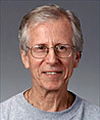Situated cognition is a theory that posits that knowing is inseparable from doing by arguing that all knowledge is situated in activity bound to social, cultural and physical contexts.

Eleanor Rosch is an American psychologist. She is a professor of psychology at the University of California, Berkeley, specializing in cognitive psychology and primarily known for her work on categorization, in particular her prototype theory, which has profoundly influenced the field of cognitive psychology.
In psychology and cognitive science, a schema describes a pattern of thought or behavior that organizes categories of information and the relationships among them. It can also be described as a mental structure of preconceived ideas, a framework representing some aspect of the world, or a system of organizing and perceiving new information, such as a mental schema or conceptual model. Schemata influence attention and the absorption of new knowledge: people are more likely to notice things that fit into their schema, while re-interpreting contradictions to the schema as exceptions or distorting them to fit. Schemata have a tendency to remain unchanged, even in the face of contradictory information. Schemata can help in understanding the world and the rapidly changing environment. People can organize new perceptions into schemata quickly as most situations do not require complex thought when using schema, since automatic thought is all that is required.

Problem solving is the process of achieving a goal by overcoming obstacles, a frequent part of most activities. Problems in need of solutions range from simple personal tasks to complex issues in business and technical fields. The former is an example of simple problem solving (SPS) addressing one issue, whereas the latter is complex problem solving (CPS) with multiple interrelated obstacles. Another classification of problem-solving tasks is into well-defined problems with specific obstacles and goals, and ill-defined problems in which the current situation is troublesome but it is not clear what kind of resolution to aim for. Similarly, one may distinguish formal or fact-based problems requiring psychometric intelligence, versus socio-emotional problems which depend on the changeable emotions of individuals or groups, such as tactful behavior, fashion, or gift choices.
Attitudes are associated beliefs and behaviors towards some object. They are not stable, and because of the communication and behavior of other people, are subject to change by social influences, as well as by the individual's motivation to maintain cognitive consistency when cognitive dissonance occurs—when two attitudes or attitude and behavior conflict. Attitudes and attitude objects are functions of affective and cognitive components. It has been suggested that the inter-structural composition of an associative network can be altered by the activation of a single node. Thus, by activating an affective or emotional node, attitude change may be possible, though affective and cognitive components tend to be intertwined.
John Robert Anderson is a Canadian-born American psychologist. He is currently professor of Psychology and Computer Science at Carnegie Mellon University.

Akeakamai was a female Atlantic bottlenose dolphin, who, along with a companion female dolphin named Phoenix, and later tankmates Elele and Hiapo, were the subjects of Louis Herman's animal language studies at the Kewalo Basin Marine Mammal Laboratory in Honolulu, Hawaii. The most well-known paper is the original work described in Herman, Richards, & Wolz (1984). Akeakamai was also the subject of many other scientific studies of dolphin cognition, language acquisition, and sensory abilities.
Jack Michael Feldman is an American psychologist best known for his work in industrial and organizational psychology. Feldman earned a Ph.D. in Social Psychology in 1972 from University of Illinois at Urbana-Champaign. He currently teaches at Georgia Institute of Technology.
Lyn Yvonne Abramson is a professor of psychology at the University of Wisconsin–Madison. She was born in Benson, Minnesota. She took her undergraduate degree at the University of Wisconsin–Madison in 1972 before attaining her Ph.D. in clinical psychology at University of Pennsylvania in 1978.
Thomas Marshall Ostrom was a psychologist who helped further the study of social psychology. Prior to Ostrom, the field explored and identified the cognitive foundations of social activity. Ostrom pushed the field to studying the social foundations of cognitive activity.
In social psychology, a motivated tactician is someone who shifts between quick-and-dirty cognitively economical tactics and more thoughtful, thorough strategies when processing information, depending on the type and degree of motivation. Such behavior is a type of motivated reasoning. The idea has been used to explain why people use stereotyping, biases and categorization in some situations, and more analytical thinking in others.
Norman Henry Anderson was an American social psychologist and the founder of Information integration theory.
Ron Sun is a cognitive scientist who made significant contributions to computational psychology and other areas of cognitive science and artificial intelligence. He is currently professor of cognitive sciences at Rensselaer Polytechnic Institute, and formerly the James C. Dowell Professor of Engineering and Professor of Computer Science at University of Missouri. He received his Ph.D. in 1992 from Brandeis University.
Bertram Gawronski is a social psychologist and professor of psychology at the University of Texas at Austin. He is known for his research in the areas of attitudes, social cognition, decision making, and moral psychology.
George Mandler was an Austrian-born American psychologist, who became a distinguished professor of psychology at the University of California, San Diego.
Jean Matter Mandler is Distinguished Research Professor of Cognitive Science at the University of California, San Diego and visiting professor at University College London.
David Richard Olson is a Canadian cognitive developmental psychologist who has studied the development of language, literacy, and cognition, particularly the mental lives of children, their understanding of language and mind and the psychology of teaching. Olson is University Professor Emeritus at the Ontario Institute for Studies in Education at the University of Toronto, where he has taught since 1966.
In cognitive psychology, the affect-as-information hypothesis, or 'approach', is a model of evaluative processing, postulating that affective feelings provide a source of information about objects, tasks, and decision alternatives. A goal of this approach is to understand the extent of influence that affect has on cognitive functioning. It has been proposed that affect has two major dimensions, namely affective valence and affective arousal, and in this way is an embodied source of information. Affect is thought to impact three main cognitive functions: judgement, thought processing and memory. In a variety of scenarios, the influence of affect on these processes is thought to be mediated by its effects on attention. The approach is thought to account for a wide variety of behavioural phenomena in psychology.
Jeffrey Sherman is a Social Psychologist and Professor of Psychology at the University of California, Davis. He is known for his research on social cognition, stereotyping, and implicit bias.




